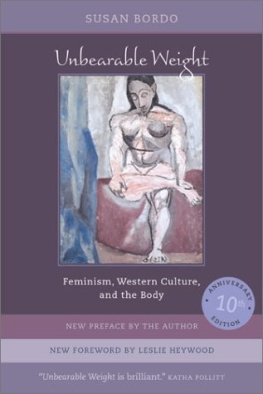Unbearable Weight, Feminism, Western Culture, and the Body
Susan Bordo
University of California Press
Berkeley Los Angeles London
"The Heavy Bear" is from Delmore Shwartz,
Selected Poems: Summer Knowledge. Copyright 1959 by Delmore Schwartz. Reprinted by permission of
New Directions Publishing Corp.
Figure 48 is reprinted from Love for
Sale: The Words and Pictures of Barbara Kruger by permission of the Mary Boone Gallery.
Figure 50 is reprinted by permission of Essence magazine. Copyright
1992 by Essence Communications, Inc.
University of California Press Berkeley and Los Angeles, California
University of California Press, Ltd. London, England
1993 by
The Regents of the University of California First Paperback Printing 1995
Library of Congress CataloginginPublication Data
Bordo, Susan, 1947
Unbearable weight: feminism, Western culture, and the body / Susan Bordo.
p. cm.
Includes bibliographical references and index. ISBN 0520088832 (pbk.)
Feminine beauty (AestheticsUnited States.
Body, HumanSocial aspectsUnited States.
Body imageUnited States. 4. Selfesteem in womenUnited States. 5. Feminist criticism United States. I. Title.
HQ1220. U5B67 1993
305.42dc20 9241582
Printed in the United States of America 9 8 7 6 5 4 3
The paper used in this publication meets the minimum requirements of American National Standard for Information SciencesPermanence of Paper for Printed Library Materials, ANSI Z39.481984.
For Edward
CONTENTS
Acknowledgments ix
Introduction: Feminism, Western Culture, and the Body
Part One Discourses and Conceptions Of The Body
Whose Body Is This? Feminism, Medicine, and the Conceptualization of Eating 45
Disorders
Are Mothers Persons? Reproductive Rights and the Politics of Subjectivity 71
Hunger as Ideology 99
Part Two The Slender Body and Other Cultural Forms
Anorexia Nervosa: Psychopathology as the Crystallization of Culture 139
The Body and the Reproduction of Femininity 165
Reading the Slender Body 185
Part Three Postmodern Bodies
Feminism, Postmodernism, and Gender Skepticism 215
"Material Girl": The Effacements of Postmodern Culture 245
Postmodern Subjects, Postmodern Bodies, Postmodern Resistance 277
Notes
Index
ACKNOWLEDGMENTS
It is extremely difficult for those of us at small colleges to find, in our heavy teaching schedules, time for writing. I have been both fortunate and highly privileged in having been given that time, in the form of more than generous institutional support from a variety of sources. Two residential fellowships, one to spend the spring semester of 1985 in Alison Jaggar's Laurie seminar at Douglass College and the second in 198788 as a Rockefeller Humanist in Residence at the Duke University/University of North Carolina Center for Research on Women, provided not only time to think and write but wonderful intellectual environments to stimulate the process. An American Council of Learned Societies/Ford Foundation Fellowship, awarded for the same period as the Rockefeller, made it possible for me to continue working on this project the following year, when I was generously granted early sabbatical leave by Le Moyne College. It is to Le Moyne that I owe my greatest debtfor several faculty research grants and course reductions in the past, for the open, diverse, and warm intellectual home that it has provided for me, and for its courageous decision to name a feminist scholar to its first endowed chair, the Joseph C. Georg Professorship. From my perspective, the award could not have been timelier announced in 1991 just as I was entering the final stages of work on this book, it has provided me with needed time for revisions, financial resources for preparation of the manuscript and illustrations, and a boost of encouragement to see me through to the culmination of what has been a long and taxingalthough absorbing and gratifyingproject.
Because this book is made up of essays written over a period of years, many different people have contributed to it in different ways. I have tried to acknowledge those contributions in an opening note for each essay I apologize for any that have gone unmentioned
out of forgetfulness. What are not represented in those notes, however, are the intellectual conversations and emotional support informally provided at various stages of this project by friends and colleagues such as Linda Alcoff, Sandra Bartky, Susan BehuniakLong, Jonathan Bennett, Janet Bogdan, Robert Bogdan, Celeste Brusati, Jack Carlson, Janet Coy, Sandra Harding, Erica Harth, Alison Jaggar, Ynestra King, Ted Koditschek, Drew Leder, Janice McLane, Paul Mattick, Mario Moussa, Jean O'Barr, Robert O'Brien, Linda Robertson, Sarah Ruddick, Jonathan Schonsheck, Maxine SheetsJohnstone, R. J. Sidmore, Cynthia Willett, Bruce Wilshire, Donna Wilshire, Iris Young, and my sisters, Binnie Klein and Marilyn Silverman. I also thank Naomi Schneider, my editor at the University of California
Press, for her encouragement and patience, Carol Miller for her reassuring expertise and professionalism in the computer preparation of the manuscript, and JaneEllen Long for her astute and clarifying copyediting.
It is impossible to measure the contributions of Lynne Arnault and LeeAnn Whites or adequately to express my gratitude for the intellectual and emotional sustenance their friendship has provided for me. Finally, I thank Edward Lee for all our years of wonderful conversation, for his integrity and individuality, for his insights, his humor, and his kindness, and for the haven of our life together.
INTRODUCTION:
FEMINISM, WESTERN CULTURE, AND THE BODY
THE HEAVY BEAR
"the withness of the body" Whitehead
The heavy bear who goes with me, A manifold honey to smear his face,
Clumsy and lumbering here and there, The central ton of every place,
The hungry beating brutish one
In love with candy, anger, and sleep, Crazy factotum, disheveling all, Climbs the building, kicks the football,
Boxes his brother in the hateridden city.
Breathing at my side, that heavy animal, That heavy bear who sleeps with me, Howls in his sleep for a world of sugar,
A sweetness intimate as the water's clasp, Howls in his sleep because the tightrope Trembles and shows the darkness beneath.
The strutting showoff is terrified, Dressed in his dresssuit, bulging his pants, Trembles to think that his quivering meat Must finally wince to nothing at all.
That inescapable animal walks with me,
He's followed me since the black womb held, Moves where I move, distorting my gesture, A caricature, a swollen shadow,
A stupid clown of the spirit's motive, Perplexes and affronts with his own darkness, The secret life of belly and bone,
Opaque, too near, my private, yet unknown, Stretches to embrace the very dear
With whom I would walk without him near,
Touches her grossly, although a word Would bare my heart and make me clear, Stumbles, flounders, and strives to be fed Dragging me with him in his mouthing care, Amid the hundred million of his kind,
The scrimmage of appetite everywhere.
Delmore Schwartz
Cultural Expressions of MindBody Dualism
Through his metaphor of the body as "heavy bear," Delmore Schwartz vividly captures both the dualism that has been characteristic of Western philosophy and theology and its agonistic, unstable nature. Whitehead's epigraph sets out the dominating, doubleedged construction, the one that contains and regulates all the othersthat of disjunction and connection, separateness and intimacy. "The withness of the body": the body as not "me'' but












